Looking for a Personalized Diet Plan?
Banana Calories, Nutrition, and Health Benefits

Bananas are more than just a convenient snack. They pack a powerful punch of nutrients that can support your overall health.
From their rich potassium content to their impressive vitamin profile, bananas offer a range of health benefits, making them a perfect addition to any balanced diet.
In this blog, we’ll explore why you should incorporate bananas into your daily routine.
We’ll also highlight how the Hint app, along with its Hint Pro and Hint Premium subscriptions, can help you track your banana intake and make the most out of its nutritional benefits.
TL;DR
- Bananas are low in calories, high in potassium, and a great source of vitamins such as B6 and C.
- They're perfect as a healthy snack and can even aid in weight management by promoting a feeling of fullness.
- If you're looking for a nutritious fruit that's easy to incorporate into your diet, bananas are an excellent choice.
- Download the Hint app to track your calories and other nutrients from bananas, and explore personalized diet plans through Hint Pro and Hint Premium.
How many calories are in a banana?
Bananas are a low-calorie food that can fit into any healthy eating plan. Here’s a breakdown of banana calories based on serving size or quantity:
| Banana Serving Size (in grams) | 1 Banana Calories (kcal) | 2 Bananas Calories (kcal) | 3 Bananas Calories (kcal) | 4 Bananas Calories (kcal) | 5 Bananas Calories (kcal) | 6 Bananas Calories (kcal) |
|---|---|---|---|---|---|---|
| 1 Piece (100 grams) | 108 | 216 | 324 | 432 | 538 | 646 |
Tracking your banana consumption is easy with the Hint app, which allows you to log your meals and calories, helping you stay on top of your dietary goals.
Whether you’re trying to lose weight, gain muscle, or maintain a healthy diet, Hint’s personalized tracking tools can guide you every step of the way.
Banana Nutrition
One piece or 100 grams of banana contains 108 kcal. It contains 92.7 % carbohydrates, 4.6% protein, and 2.7 % fat. Bananas are a good source of potassium, vitamin C, manganese, and vitamin B6.
Here’s a look at the nutritional content of 100 grams of banana:
| Nutrient | Amount per 100 grams |
|---|---|
| Energy ( kcal) | 108 |
| Protein (g) | 1.25 |
| Carbohydrates (g) | 25 |
| Fat (g) | 0.3 |
| Sugar (g) | 14.9 |
| Dietary fiber (g) | 2.2 |
| Sodium (mg) | 1.0 |
| Potassium (mg) | 362 |
| Manganese(mcg) | 0.4 |
| Vitamin C (mg) | 8.06 |
| Vitamin B6 (mg) | 0.5 |
| Vitamin B7 (mg) | 1.5 |
With the Hint app, you can easily track these nutrients and make sure you’re meeting your daily nutritional requirements.
Plus, with Hint Pro and Hint Premium, you can access personalized diet plans tailored to your health goals, ensuring you’re getting the right nutrients from every meal.
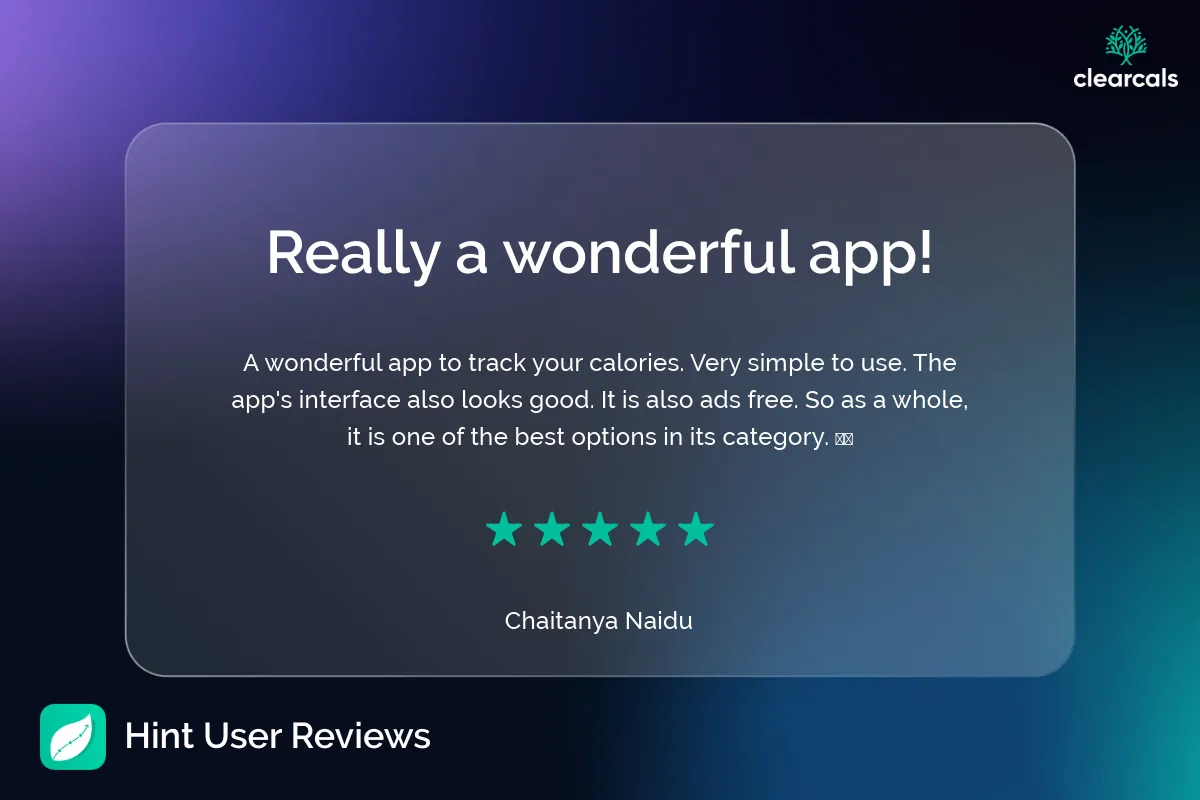
Banana Benefits
Bananas offer numerous health benefits that make them a great addition to your diet. Here’s why you should regularly enjoy this delicious fruit:
1. Improve Heart Health
Bananas are rich in potassium, an essential mineral for maintaining healthy blood pressure and reducing the risk of heart disease. By incorporating bananas into your diet, you can support cardiovascular health naturally.
2. Aid in Digestion
Bananas contain insoluble fiber, which promotes healthy digestion and prevents constipation. This makes them a great snack for maintaining a healthy gut.
3. Support Muscle Function
Potassium and magnesium, both found in bananas, play a crucial role in muscle function. Potassium regulates muscle contractions, while magnesium helps relax muscles, making bananas a great post-workout snack.
4. Boost Energy Levels
As a carbohydrate-rich fruit, bananas are a quick source of energy. Vitamin B6 helps the body metabolize food into energy, so a banana is perfect for an energy boost during a busy day.
5. Improve Mood
Vitamin B6 also plays a role in producing serotonin, a neurotransmitter that regulates mood. Including bananas in your diet can support emotional well-being, especially when paired with Hint Premium, which offers access to expert dietitians who can help guide your nutrition for mental health.
6. Support Kidney Health
Bananas’ potassium content helps regulate blood pressure and reduces the risk of kidney stones, supporting long-term kidney health.
7. Protect Against Cancer
Bananas contain antioxidants like lectin, which may help protect against certain types of cancer by neutralizing free radicals in the body.
8. Promote Weight Loss
Bananas are low in calories and high in fiber, making them a satisfying snack that can support weight loss by helping control appetite. Use the Hint app to track your calorie intake and optimize your diet for weight management.
9. Support Post-Exercise Recovery
Bananas help replenish energy and prevent muscle cramps after exercise, making them a go-to post-workout snack.
10. Improve Skin Health
Bananas are rich in vitamin C, which supports collagen production and keeps your skin looking youthful and healthy.
Top 10 Recipes of Banana
Bananas are versatile and can be incorporated into various delicious recipes. Whether you're looking for a quick snack or a satisfying meal, here are some popular banana-based recipes:
1. Banana Lassi Calories

1 glass (240 mL) of banana lassi has 245 kcal. Out of these calories, 61.3% is from carbohydrates, 11.1 % is from protein, and 27.6 % is from fat.
Banana lassi is a good source of protein, probiotics, potassium, vitamin D, phosphorus, riboflavin, and vitamin B6, and an excellent source of calcium, and vitamin B12. HINT: This refreshing drink helps to soothe the digestive system and boosts immunity.
2. Banana Raita Calories
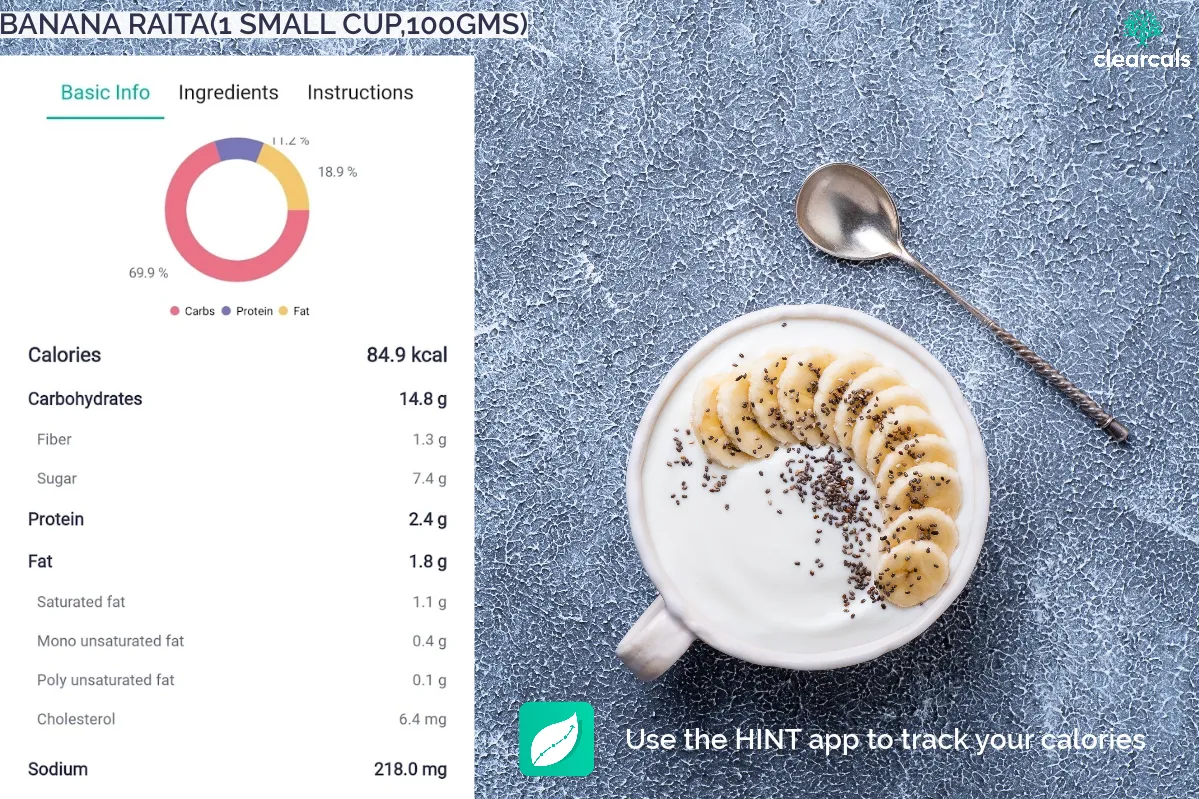
1 small cup ( 100 grams ) of banana raita has 85 kcal. Out of these calories, 69.9% is from carbohydrates, 11.2 % is from protein, and 18.9 % is from fat.
Banana raita is a good source of probiotics, protein, vitamin B6, and vitamin B12. It helps in boosting immunity and in the production of red blood cells.
3. Banana Milkshake Calories

How Many Calories in Banana Shake?
The number of calories in a banana shake depends on the ingredients. A basic banana shake of 240 mL contains about 262 calories. If you add ingredients like peanut butter, honey, or protein powder, the calorie content will increase.
Banana Shake Nutrition
1 glass (240 mL) of banana milkshake has 262 kcal. Out of these calories, 57.0 % is from carbohydrates, 9.9 % is from protein, and 33.1 % is from fat.
Banana milkshakes are a good source of protein, potassium, vitamin D, riboflavin, calcium, phosphorus, magnesium, selenium, and an excellent source of vitamin B6, vitamin B12, and manganese.
Individuals with diabetes, prediabetes, and insulin resistance should avoid this milkshake as it contains high sugar content.
How Much Protein in Banana Shake?
A typical glass (240 mL) of banana shake contains about 6.5 grams of protein. The protein content will change depending on whether you use regular milk, almond milk, or add other protein sources like nuts or protein powder.
Is Banana Shake Healthy?
Yes, banana shakes can be very healthy when made with wholesome ingredients. They are a good source of potassium, vitamin C, and dietary fiber.
Adding ingredients like chia seeds or flaxseeds can further boost the nutritional value, making it a nutrient-dense meal or snack.
Is Banana Shake Good for Weight Gain?
Banana shakes are a great option for weight gain as they are calorie-dense and easy to consume. You can increase the calorie content by adding high-calorie ingredients like full-fat milk, peanut butter, nuts, or protein powder.
Drinking banana shakes regularly can help you meet your calorie goals for healthy weight gain.
Is Banana Milkshake Good for Weight Loss?
Banana milkshakes can be good for weight loss when made with low-calorie, nutritious ingredients like almond milk or low-fat yogurt. They provide a satisfying combination of fiber and protein that can help control appetite and support weight management.
Just avoid adding high-calorie sweeteners like honey or sugar to keep the shake low in calories.
4. Banana Dates Milkshake Calories

1 glass (240 mL) of banana dates milkshake has 269 kcal. Out of these calories, 59.0 % is from carbohydrates, 9.4 % is from protein, and 31.6 % is from fat.
Banana dates milkshakes are a good source of potassium, protein, riboflavin, vitamin D, calcium, phosphorus, magnesium, selenium, and manganese, and an excellent source of vitamin B6, and vitamin B12. Individuals with diabetes, prediabetes, and insulin resistance should avoid this milkshake as it contains high sugar content.
5. Banana Nuts Milkshake Calories
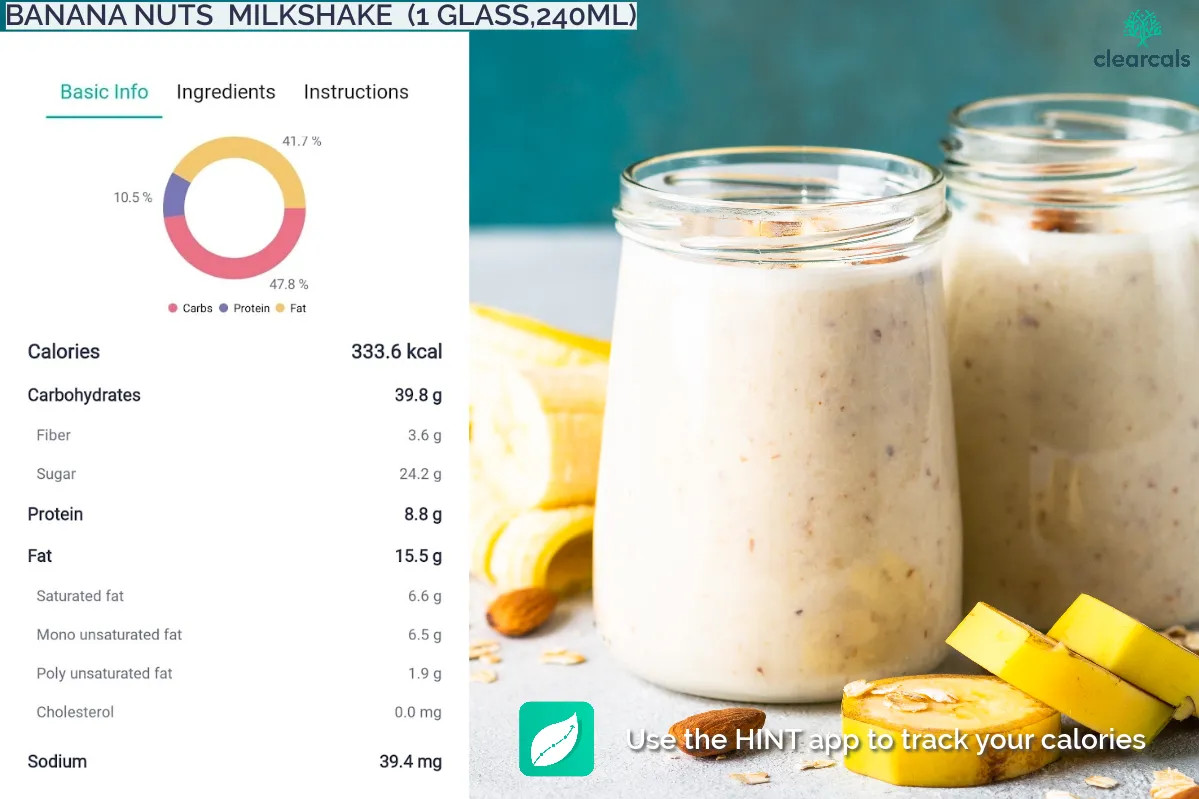
1 glass (240 mL) of banana nuts milkshake has 334 kcal. Out of these calories, 47.8 % is from carbohydrates, 10.5 % is from protein, and 41.7 % is from fat.
Banana nuts milkshake is a good source of protein, dietary fiber, potassium, vitamin D, and riboflavin, vitamin B5, biotin, calcium, selenium, and an excellent source of vitamin B6, vitamin B12, vitamin E, phosphorus, magnesium, copper, manganese. Individuals with diabetes, prediabetes, and insulin resistance should avoid this milkshake as it contains high sugar content.
6. Banana Smoothie Calories
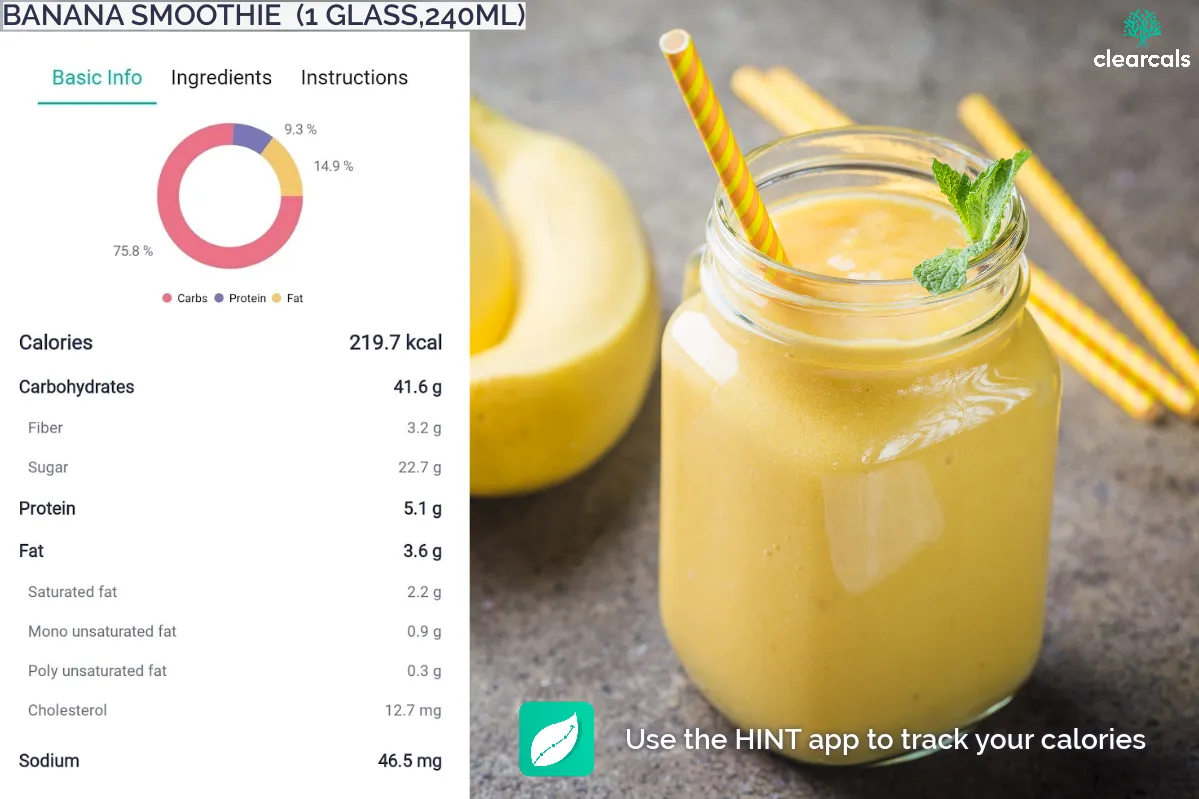
1 glass (240 mL) of banana smoothie has 220 kcal. Out of these calories, 75.8 % is from carbohydrates, 9.3 % is from protein, and 14.9 % is from fat.
Banana smoothie is a good source of protein, fiber, potassium, calcium, phosphorus, magnesium, vitamin B12, manganese, and an excellent source of vitamin B6. Individuals with diabetes, prediabetes, and insulin resistance should avoid this milkshake as it contains high sugar content.
7. Banana Oats Smoothie Calories
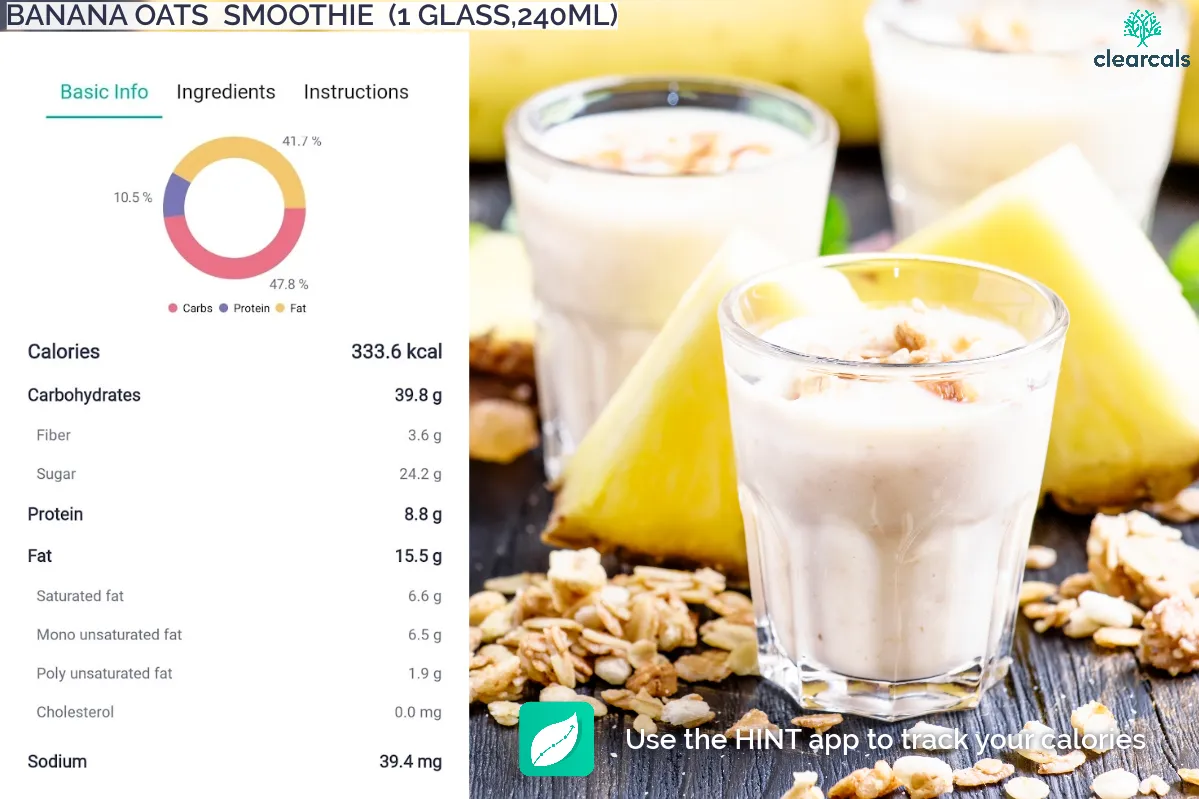
1 glass (240 mL) of banana oats smoothie has 231 kcal. Out of these calories, 71.9 % is from carbohydrates, 11.1 % is from protein, and 17.0 % is from fat.
Banana oats smoothie is a good source of probiotics, dietary fiber, protein, calcium, phosphorus, magnesium, selenium, manganese, potassium, vitamin D, and vitamin B12, and an excellent source of vitamin B6. It makes a perfect pre-workout meal and aids in weight loss.
8. Mango Banana Smoothie Calories
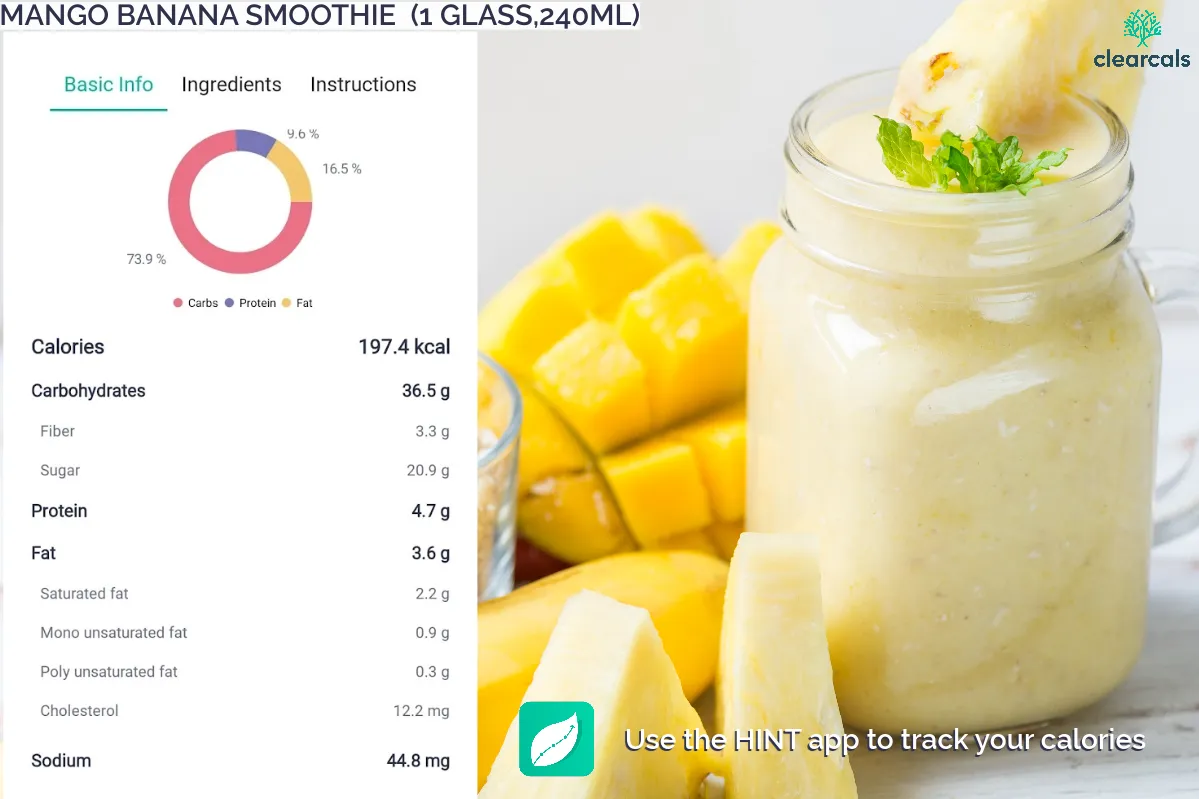
1 glass (240 mL) of mango banana smoothie has 197 kcal. Out of these calories, 73.9 % is from carbohydrates, 9.6 % is from protein, and 16.5 % is from fat.
Mango banana smoothie is a good source of potassium, dietary fiber, vitamin B12, calcium, phosphorus, magnesium, and manganese, and an excellent source of vitamin B6, vitamin C, and vitamin D. Individuals with diabetes, prediabetes, and insulin resistance should avoid this smoothie as it contains high sugar content.
9. Banana Green Smoothie Calories
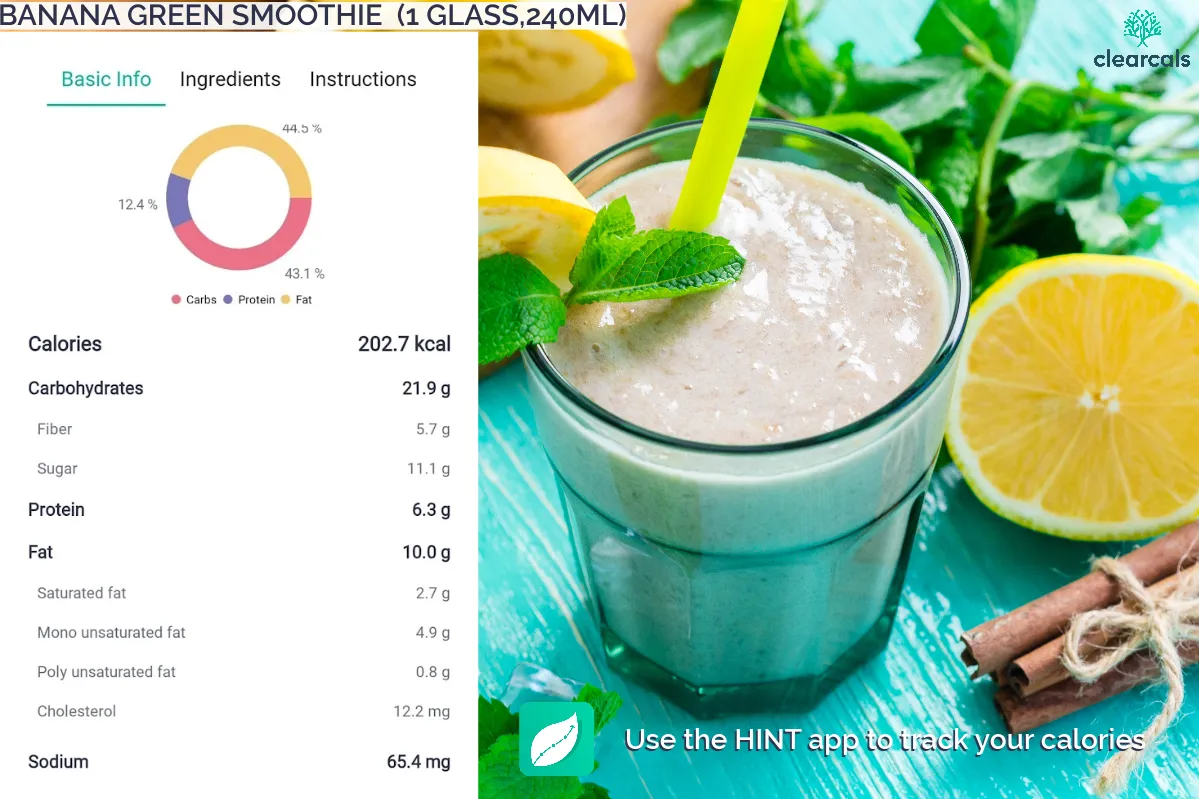
1 glass (240 mL) of banana green smoothie has 203 kcal. Out of these calories, 43.1 % is from carbohydrates, 12.4 % is from protein, and 44.5 % is from fat.
Banana green smoothie is a good source of probiotics, potassium, dietary fiber, protein, thiamin, riboflavin, vitamin B5, biotin, vitamin B12, vitamin D, calcium, phosphorus, beta carotene, lutein, and an excellent source of copper, magnesium, manganese, vitamin B6, vitamin C. It helps boost immunity and aids in weight loss.
10. Cinnamon Oats Porridge with Banana and Strawberries
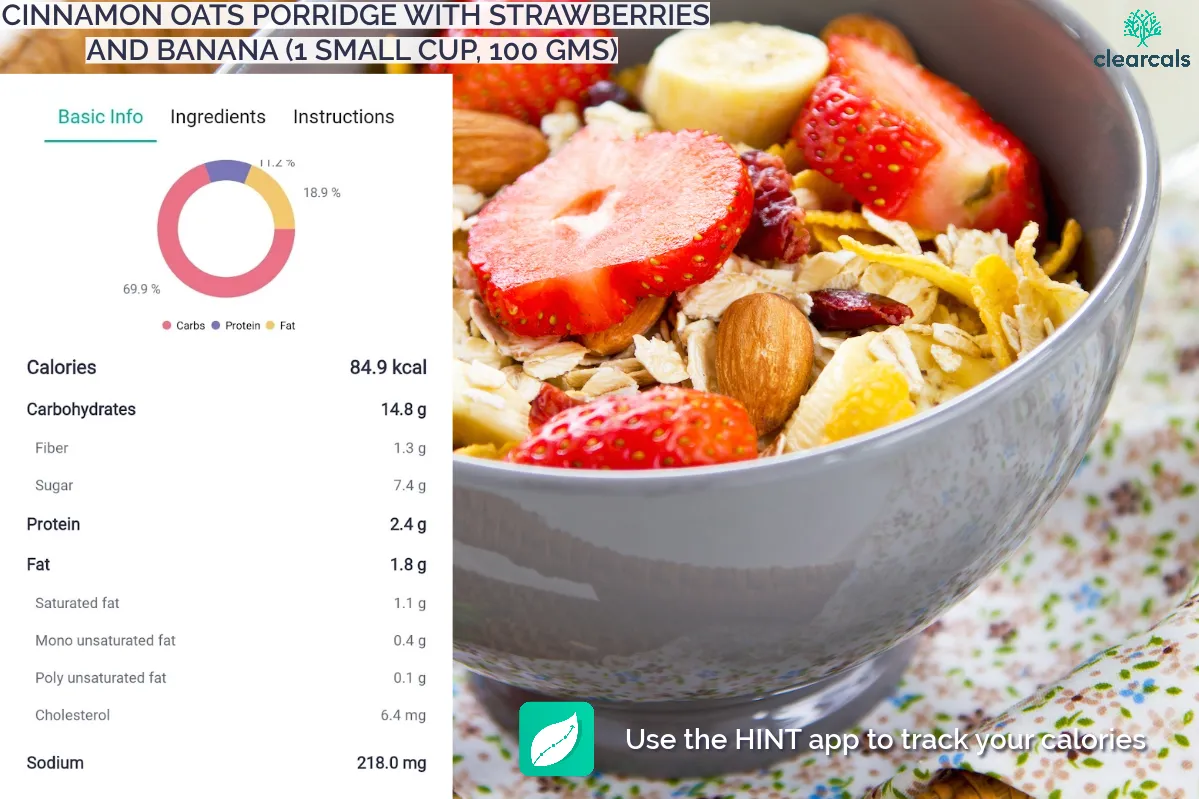
1 small cup ( 100 grams ) of cinnamon oats porridge with banana and strawberries
has 85 kcal. Out of these calories, 59.8 % is from carbohydrates, 11.9 % is from protein, and 28.3 % is from fat.
Cinnamon oats porridge with banana & strawberries is a good source of selenium, phosphorus, thiamine, vitamin C, and vitamin D. It helps in blood sugar control and aids in weight loss.
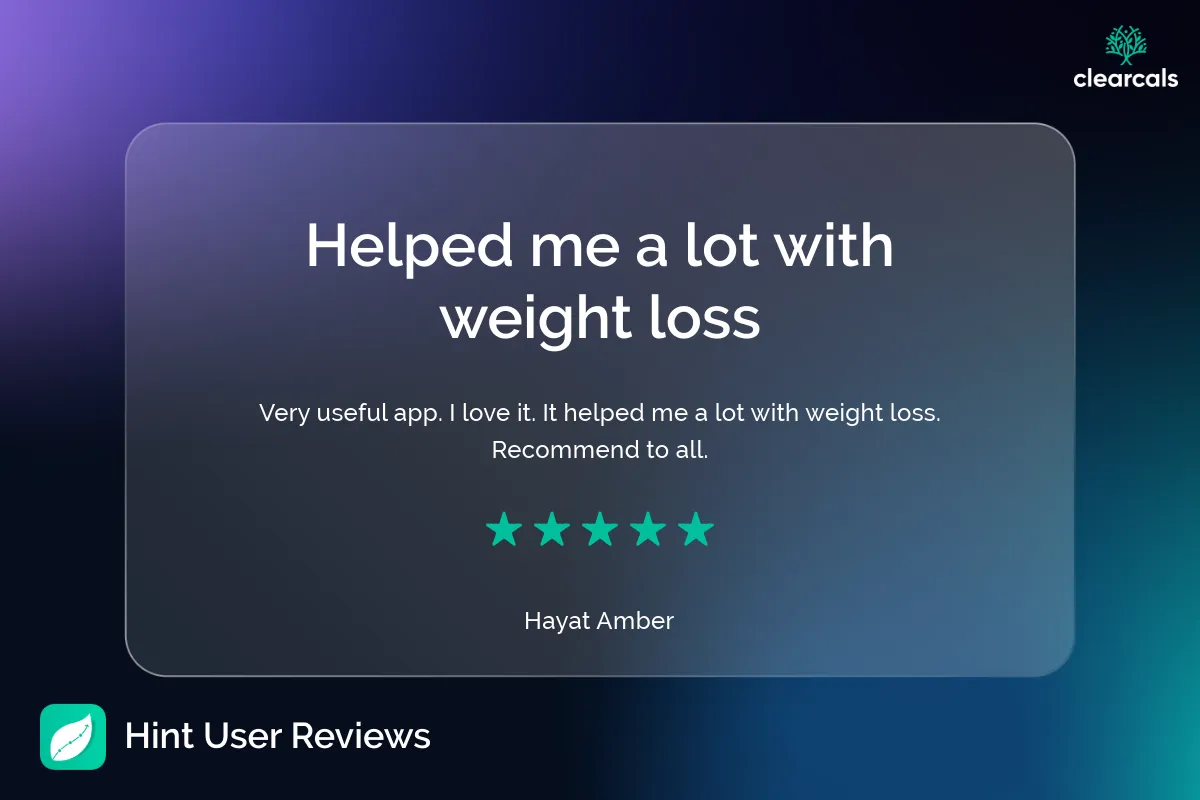
How the Hint App Can Help You
The Hint app is a powerful tool that helps you track your calories, log meals, and monitor your nutrient intake. Whether you’re incorporating bananas into your diet for heart health, energy, or weight loss, Hint makes it easy to stay on top of your goals.
With Hint Pro, you’ll get access to personalized diet plans, allowing you to tailor your meals to your specific health needs. Whether you're tracking calories from bananas or looking for a comprehensive diet plan, Hint Pro has you covered.
For more advanced features, Hint Premium offers unlimited consultations with expert dietitians who can provide personalized advice. They’ll help you fine-tune your diet to ensure you're getting the most out of your banana consumption and overall nutrition.
Conclusion
Bananas aren’t just a delicious and convenient snack; they offer a wide range of health benefits that make them an essential part of a well-balanced diet.
Whether you're looking to improve heart health, boost energy, or support muscle function, bananas can play a key role in your health journey.
By using the Hint app, along with Hint Pro and Hint Premium, you can easily track your nutrient intake, customize your diet, and access expert advice to make sure you're meeting all your nutritional needs.
Incorporate bananas into your diet today and see the difference they can make in your overall well-being.
Frequently Asked Questions
1. Is Banana Good for Weight Gain?
Yes, bananas are an excellent choice for those aiming to gain weight. They are calorie-dense and provide a good amount of carbohydrates, which are essential for healthy weight gain.
Pairing bananas with high-calorie foods like peanut butter or full-fat dairy can help you increase your calorie intake and promote weight gain.
2. Which Banana is Good for Weight Gain?
If you're looking to gain weight, ripe bananas are a great option. They are high in natural sugars and carbohydrates, providing a quick source of calories.
Varieties like Cavendish bananas, which are commonly available, are ideal for weight gain due to their sweetness and carbohydrate content.
Including bananas in shakes or smoothies can help you pack in extra calories without feeling too full.
3. Is It Good to Eat Banana on Empty Stomach?
While bananas are a great source of nutrients, some experts suggest avoiding bananas on an empty stomach. This is because the high levels of natural sugars in bananas may cause a spike in energy, followed by a crash later.
Additionally, their acidity may cause digestive discomfort in some individuals. Pairing bananas with other foods like yogurt or oats may help balance their effects.
4. Is It Good to Eat Banana at Night?
Eating a banana at night can be beneficial as it helps promote relaxation and sleep. Bananas contain magnesium and tryptophan, both of which aid in muscle relaxation and the production of serotonin, a neurotransmitter that supports good sleep.
However, if you're concerned about weight gain, consuming bananas late at night may not be ideal for everyone as they are still a source of calories.
5. Is Banana Bad for Cough?
Bananas are generally safe to eat when you have a cough, and they don’t typically worsen symptoms.
In fact, bananas are soft and easy to digest, which can be soothing if you're experiencing throat irritation. However, avoid consuming bananas late at night if you have a cough, as it may cause mucus buildup.
6. Is Banana Good for Hair Growth?
Yes, bananas are beneficial for hair growth due to their high content of vitamins and minerals, such as potassium, vitamin B6, and silica. These nutrients help nourish the scalp, strengthen hair, and prevent hair damage.
Some people even use mashed bananas as a natural hair mask for added moisture and shine.
7. Is Banana Chips Healthy?
Banana chips can be a tasty snack, but they are not always considered healthy due to the frying process and added sugars often found in commercially available options.
For a healthier alternative, look for baked or air-dried banana chips, which contain fewer calories and fat.
8. Is Banana Chips Good for Weight Loss?
While bananas themselves can be a great addition to a weight-loss diet, banana chips are generally not a good option for weight loss.
Banana chips are often deep-fried and contain high amounts of added sugar and unhealthy fats, which can significantly increase their calorie content. If you're trying to lose weight, opt for fresh bananas instead.
Exclusive Offer: Enjoy One Month of Free Hint Premium Access
When you purchase any of the following from the Clearcals Store: Garmin Venu Sq 2, Garmin Vivoactive 5, Garmin Instinct 2, Instinct 2X Solar, or Instinct 2X Solar Tactical, you'll receive one month of free Hint Premium (worth Rs. 1999), which includes:
✅ Unlimited dietitian consultations
✅ Personalized diet and workout plans
✅ Advanced calorie and nutrition tracking
🚀 Visit the Clearcals Store today and unlock your free Hint Premium access





